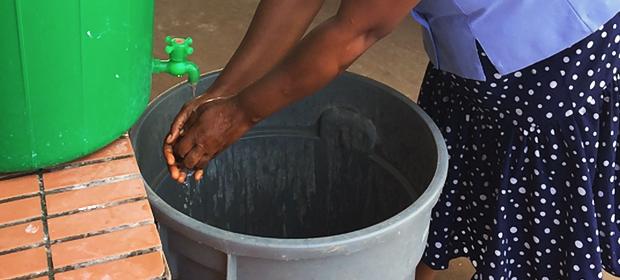Where We Work
See our interactive map


Monrovia, Liberia — Every time I walk into a building, I wash my hands at a station with chlorine and water before someone takes my temperature.
Sometimes I have to wear a sticker with my temperature written on it. Hand sanitizer is abundant.
And no one touches anyone else. You wouldn’t believe how often you casually shake hands, touch a shoulder in greeting, or hug a friend you haven’t seen in years, until you cannot.
Everything is far from normal in the place I’ve called my second home.
Billboards and walls throughout Monrovia, Liberia, feature messages on Ebola prevention, and banners everywhere shout: “EBOLA IS REAL.”
The Ministry of Health and Social Welfare—where I am posted—has a significant international presence. Every office has multiple foreign aid workers sitting together, working alongside Liberian government employees.
This is what it’s like day-to-day working in Monrovia. But it doesn’t capture the distrust and frustrations Liberians are feeling toward their government, or the political complexities, communication gaps, and competition for attention from the local and international response community.
While Ebola transmission rates appear to be decreasing, or at least leveling off, Liberia is not out of crisis, and everything is far from normal in the place I’ve called my second home.
But unlike in media representations, the Liberia I’m living in today is taking obvious measures to prevent the spread of Ebola, including routine hand-washing and temperature-taking.
And Liberians are very clearly planning for life post-Ebola. Meetings are being held throughout the country as Liberia gears up to rebuild the health system now crippled by Ebola.
They always ask, "How long will you be in the country?"
My mission in Liberia is to help build a strong team within the ministry to develop and roll out a mobile health approach—mHero—in partnership with the Liberian government and UNICEF. Before I arrived a couple of weeks ago, UNICEF staff had begun to lay the groundwork for mHero in Liberia.
When we talk with senior leaders in the ministry about it, they all ask the same things:
They have good reason to ask. The ministry has been bombarded with supposed fix-all solutions and purported problem-solvers who swoop in and leave in a matter of weeks. Staff from many of the ministry’s development partners have been evacuated during the crisis. Skepticism and distrust remain, and rightfully so.
So I explain that mHero—or mobile Health Worker Electronic Response and Outreach—is an approach that leverages existing, sustainable technologies to serve as a communications, management, and planning tool the ministry can use to support health workers throughout the country—both now and after the crisis.
mHero provides an approach for two-way communication with health workers and facilities through existing systems that can be linked, including IntraHealth’s iHRIS, UNICEF’s RapidPro, and DHIS2, and utilizing the OpenHIE architecture. By using mHero, health workers can communicate their needs in real-time and stay connected to and supported by the system. It lets the ministry communicate directly with health workers, allowing for streamlined communication of urgent operations information, critical continuing professional development messages, and surveillance data.
Together, we are making headway. Close collaboration between the ministry, UNICEF, and IntraHealth has allowed us to build a multisectoral team that spans most branches of the ministry (Human Resources, Personnel, Health Management Information Systems, and Health Services), which will allow mHero to operate within the ministry much like iHRIS and DHIS2 already do.
Once senior ministry leaders have given their approval, we will pilot test mHero. It is critical that the ministry buys in, engages, and owns mHero if it is to make a difference during and beyond the current crisis. Governance also must be emphasized, established, and followed from the beginning, and communication around roles and responsibilities must be crystal clear.
We all want mHero to be a strong case study of mHealth/eHealth integration in Liberia—one that makes an impact now and in the future.
Our daily progress is “small small,” as they say in Liberia.
Some say Liberia is no longer in crisis now that the number of new cases is stabilizing and declining. But now is the time to keep up the momentum of the response.
By working with the ministry to develop and deploy mHero as a means to communicate, plan, and manage its workforce, we can help health workers prevent and treat Ebola effectively and efficiently. Ultimately, we want not only to help Liberia prevent a resurgence of the current epidemic but also to build a better foundation for a stronger, more resilient health system in the future.
My time in Liberia is unfortunately limited. I know it will be hard to leave my second home again. But I hope that by the time I say my goodbyes, I will have helped create a strong team that will continue to roll out mHero throughout the country.
Our daily progress may be “small small,” as they say in Liberia, but I am convinced that it is tangible and will have lasting impact in supporting health workers and saving lives.
Read more about how you can help stop Ebola in Liberia.
Photo by Leah McManus.
Get the latest updates from the blog and eNews




